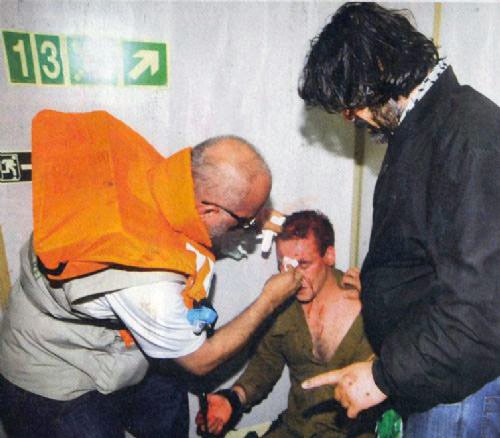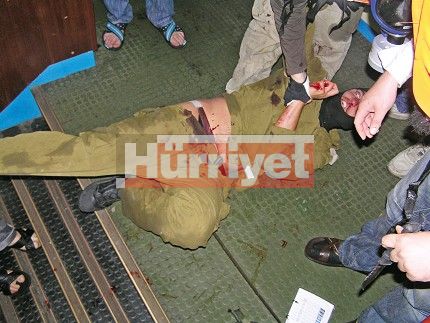Monday
Jun072010
Iran Analysis: One Year After the Election (Shafaee)
 Monday, June 7, 2010 at 6:06
Monday, June 7, 2010 at 6:06  Masoud Shafaee writes for The Guardian of London:
Masoud Shafaee writes for The Guardian of London:At the beginning of June last year, a thaw in Iranian-American relations looked increasingly likely. President Obama had been inaugurated less than five months earlier, promising the leaders of the Islamic Republic that America would "extend" its hand if the Iranians were willing to "unclench" their fists. Having been vilified as part of an "axis of evil" by the Bush administration, the Iranian leadership suddenly faced a harder time painting the United States, with its charismatic new president and his middle name of Hussein, as "the Great Satan". Obama even recognised Iran's right to enrich uranium, something the previous administration had refused to do.
In Iran, a similar political realignment was under way. The country not only faced staggering inflation and unemployment, but had had three sets of UN Security Council sanctions imposed on it since Mahmoud Ahmadinejad took office. With two-thirds of its population under the age of 30 and pressing for more social freedoms, the incumbent president was by no means a popular candidate heading into the 2009 election.
In the final weeks of the campaign, the progressive-minded youth mobilised en masse to ensure that he would not be re-elected. As Mir Hossein Mousavi, the main reform candidate and eventual figurehead of the Green movement, put it just before election day, the atmosphere in the country was "similar to the first days after … the revolution".
But Mousavi was by no means a foe of the establishment either. Having served as prime minister for almost the whole of the eight-year Iran-Iraq war and under Ayatollah Ruhollah Khomeini, the Islamic Republic's founding father, Mousavi had the respect of many in the establishment. In fact, he was one of only four candidates not disqualified from running for president in 2009 by the Guardian Council, the regime's constitutional vetting body. Even at present, Mousavi stresses the importance of staying true to Khomeini's vision and within the constitution's framework.
Which is what made the rigging of last year's election so remarkable. For the Islamic Republic, Mousavi was the right man at the right time: a former revolutionary suited to steering Iran through rapprochement with a remarkably different White House. With respect to Iran's nuclear programme, the core issue guiding its foreign policy, he openly statedthat he would not compromise on the country's inalienable rights. President Obama even posited just five days after the contested election that policy differences between Mousavi and Ahmadinejad "may not be as great as [had] been advertised".
Policy differences aside, the Islamic Republic's image would have greatly benefited from a Mousavi presidency. In a region dominated by authoritarian Arab states, Iran's theocracy has always been the exception. What's more, the democratic elements of the Islamic Republic's constitution – however tattered they may now be – have been a source of the regime's authority. The election of a socially progressive reformist over a far-right incumbent would have done much for its perceived legitimacy. Perhaps this is why the vote was so lopsidedly fixed.
Driven by motives of political survival, a fringe "New Right" ultimately took Iran hostage. Not wanting to relinquish power through its loss at the polls, the current administration has not only weakened the regime, but in the face of an enduring and growing opposition, has perhaps hastened its demise.
On the nuclear front, Iran is facing a fourth set of Security Council sanctions –the first since Obama took office. The uranium-for-fuel deal that the White House was proposing back in February is now being rebuffed after Iran agreed to come to the table following Turkish and Brazilian mediation. And with the hastily rigged election, the Islamic Republic has suffered considerable harm to its image and to its clout. Ahmadinejad's second term was widely seen as illegitimate from the start, and the regime chose not only to reaffirm the election results but to severely repress the opposition. Whatever "democratic" lustre the Islamic republic once had has surely now been irreparably tarnished.
More consequentially, perhaps, the regime has lost its religious standing in the eyes of countless Muslims. In a region with an increasing number of devout followers – be they Sunni or Shia – it was always the Islamic component of the "Islamic republic" that earned Iran admiration outside its borders. A year after the election, in the face of overwhelming evidence of state-sanctioned murder, torture and even rape, the regime's moral authority is in shreds. Several of Iran's grand ayatollahs have even publicly blasted the government during the last year. As the late dissident cleric Grand Ayatollah Hussein-Ali Montazeri, the former heir apparent to Khomeini, put it: "This regime is neither Islamic nor a republic."
Today, many are speculating about the death of the Green movement. Following a brutal crackdown, the massive protests seen in June tapered off, before being definitively suppressed on the Islamic Republic's 31st anniversary in February. Yet while the streets may now be emptier, the Green movement is far from finished. As the Iranian saying goes, "There is fire under the ash."
Read rest of article....





